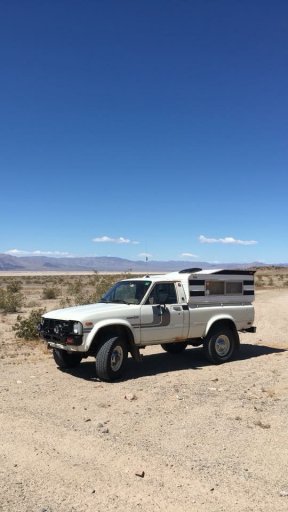I have been a fan of offroading and camping all my life and have recently got an interest in overlanding. So my question is to your fine community is "what you running?" Steel or alloy rims. I favor steel as if it is damaged it can be repaired and limped out of the woods fairly easy. However I see many of you run alloys. Pros vs cons?
Alloys or steel rims
- Thread starter Jsherris
- Start date
I run steel bead locks for the abuse they can take and not fail. Rash it, just grind it and paint. I hit a watermelon size boulder at 55mph on a corner with a steel rim on a car. Exposed the bead but didn't break it. Took it home and pounded back in place with a 5lb sledge. If it was alloy, I'd probably be dead after it shattered it. The weight sucks but that's about it.I have been a fan of offroading and camping all my life and have recently got an interest in overlanding. So my question is to your fine community is "what you running?" Steel or alloy rims. I favor steel as if it is damaged it can be repaired and limped out of the woods fairly easy. However I see many of you run alloys. Pros vs cons?
Perhaps I should invest in some bead locks haha. I never thought about taking that route mainly because I don't consider myself an extreme offroader by any means but it sounds like a solid investment.I run steel bead locks for the abuse they can take and not fail. Rash it, just grind it and paint. I hit a watermelon size boulder at 55mph on a corner with a steel rim on a car. Exposed the bead but didn't break it. Took it home and pounded back in place with a 5lb sledge. If it was alloy, I'd probably be dead after it shattered it. The weight sucks but that's about it.
Just allows you to deflate tires to extreme lows without worrying about your rim and tire separation. My truck is my daily driver, so it doesn't get beat up. Just an idea.Perhaps I should invest in some bead locks haha. I never thought about taking that route mainly because I don't consider myself an extreme offroader by any means but it sounds like a solid investment.
I've run both steel and alloy over the years.
Steel will hold air and can sort-of be repaired/bodged in the field, but it's very heavy and the worst kind of weight: unsprung rotating mass. I have managed to bend several steel wheels over the years on fairly mild trails, as a result, I believe they are more easily bent than alloy wheels are cracked. I currently run my OEM alloy wheels and I've done more off road miles on alloys than I have on steel. I've never cracked or broken an alloy despite doing the most aggressive wheeling I've ever done and running high speeds across the open desert. Alloys are also lighter weight, and while they can crack and be rendered useless, I think the chances of that are so slight that it doesn't bother me. Anything that hits hard enough to crack one of my rims is probably going to take out major suspension components regardless of what rim is on the vehicle - so a cracked alloy or a wadded up steel rim will be the least of my worries.
Steel will hold air and can sort-of be repaired/bodged in the field, but it's very heavy and the worst kind of weight: unsprung rotating mass. I have managed to bend several steel wheels over the years on fairly mild trails, as a result, I believe they are more easily bent than alloy wheels are cracked. I currently run my OEM alloy wheels and I've done more off road miles on alloys than I have on steel. I've never cracked or broken an alloy despite doing the most aggressive wheeling I've ever done and running high speeds across the open desert. Alloys are also lighter weight, and while they can crack and be rendered useless, I think the chances of that are so slight that it doesn't bother me. Anything that hits hard enough to crack one of my rims is probably going to take out major suspension components regardless of what rim is on the vehicle - so a cracked alloy or a wadded up steel rim will be the least of my worries.

Member III
The advantages of steel have diminished significantly over the years.
Price-wise, while you can find cheap steel wheels for as little as 75ish each, you can also find aluminum ones of the same specs for 90-100 each through the same channels. So, the days where aluminum wheels were inherently 2 or 3 times the cost are over.
Yes, you will often be able bend the steels back into a functional shape. However, as mentioned, the odds of seriously damaging an aluminum rim doing anything short short of desert racing or aggressive rock crawling are quite slim. This is especially true if appropriately-sized tires are matched with the wheels; I have a sneaking hunch that folks tend to compare 15x7 steel wheels inside 35" tires to 20x10 aluminum wheels inside 35" tires, and then note how the large aluminum rims are much more likely to get damaged on the trail.
In short, I would never buy steels for anything except a beat-around toy vehicle.
Price-wise, while you can find cheap steel wheels for as little as 75ish each, you can also find aluminum ones of the same specs for 90-100 each through the same channels. So, the days where aluminum wheels were inherently 2 or 3 times the cost are over.
Yes, you will often be able bend the steels back into a functional shape. However, as mentioned, the odds of seriously damaging an aluminum rim doing anything short short of desert racing or aggressive rock crawling are quite slim. This is especially true if appropriately-sized tires are matched with the wheels; I have a sneaking hunch that folks tend to compare 15x7 steel wheels inside 35" tires to 20x10 aluminum wheels inside 35" tires, and then note how the large aluminum rims are much more likely to get damaged on the trail.
In short, I would never buy steels for anything except a beat-around toy vehicle.

Enthusiast III
Buy steel if you are on a budget? That was my rationale.
Only thing I'd add to the debate is that if you are going to buy alloy wheels because they are lighter, then MAKE SURE THEY ARE ACTUALLY LIGHTER. Not all alloy wheels are "light".
I run the Cragar "soft 8" steel wheels which are common for off-road use. My 15x8 steel wheels weigh 26lbs each. If I were to buy alloy wheels going under the assumption that alloy is always lighter then it wouldn't be hard for me to wind up with an alloy wheel of the same spec that was heavier than 26lbs. In that case, I might have a better looking Jeep but I would have defeated the original intention.
Only thing I'd add to the debate is that if you are going to buy alloy wheels because they are lighter, then MAKE SURE THEY ARE ACTUALLY LIGHTER. Not all alloy wheels are "light".
I run the Cragar "soft 8" steel wheels which are common for off-road use. My 15x8 steel wheels weigh 26lbs each. If I were to buy alloy wheels going under the assumption that alloy is always lighter then it wouldn't be hard for me to wind up with an alloy wheel of the same spec that was heavier than 26lbs. In that case, I might have a better looking Jeep but I would have defeated the original intention.

Member III
Aluminum all the way. If you buy cheap it doesn't matter what you buy, its going to have problems if you abuse it.
On my TJ, I would run 8psi rock crawling. Bead locks are a must. I've tagged the rim hard and watched others do the same. We bend rims. I haven't seen an alloy break since the 80s. Even then, those were cheap rims. I have a few buddies with desert trucks. You don't put steel rims on those and expect to finish a race. Both of those are extreme. My cruiser gets alloys too. I don't beat it like the rock crawl rig or the desert trucks but a have done a pretty good clip down a dry wash and tagged a rock or two. Aluminum will absorb shock.
What someone buys is going to be preference. My preference is aluminum.
Back in the late 70's, one of the off road magazines, had an ad for centerline rim's. The picture was a desert race buggy coming into the pit. Lost the tire and had driven it over 50 miles on just the rim. The beads on the rim were gone and all that was there was the rim barrel. Didn't break, held up and was still sort of round. You will never see a steel rim do that.
On my TJ, I would run 8psi rock crawling. Bead locks are a must. I've tagged the rim hard and watched others do the same. We bend rims. I haven't seen an alloy break since the 80s. Even then, those were cheap rims. I have a few buddies with desert trucks. You don't put steel rims on those and expect to finish a race. Both of those are extreme. My cruiser gets alloys too. I don't beat it like the rock crawl rig or the desert trucks but a have done a pretty good clip down a dry wash and tagged a rock or two. Aluminum will absorb shock.
What someone buys is going to be preference. My preference is aluminum.
Back in the late 70's, one of the off road magazines, had an ad for centerline rim's. The picture was a desert race buggy coming into the pit. Lost the tire and had driven it over 50 miles on just the rim. The beads on the rim were gone and all that was there was the rim barrel. Didn't break, held up and was still sort of round. You will never see a steel rim do that.
Steel was it back-the-day. I have bent and repaired a few. But the rims out today are far superior to those old alloy rims..As was stated above you do have to compare apple to apples, some alloys are the same weight as steel. I don't like to run those metal "Snowflakes" some company s put out, but like the "simpler" style like, "D"s or "O"'s or crosses...and also if your going to run Really low air, Save money and get Beadlocks the first time...

Influencer I
- 2,358
- First Name
- Dillon
- Last Name
- Wilke
- Member #
-
20298
- Ham/GMRS Callsign
- KJ7LVO/ WRQL275
- Service Branch
- USAF
For 90% of situations it really doesnt matter. I run alloys on my current rig as thats what the factory wheels are. The bit of trails and exploring I do anymore I will never have a problem with the wheels due to their material.
Really what it comes down to is this, if you run rocky trails and are aired down a lot and to very low pressure then steel is the way to go. But if youre just cruising 2 track and only drop air pressure down a bit an alloy will be just fine. The reduced weight of alloys will help with ride quality, handling, fuel economy, and reduced wear on wheel bearings and ball joints.
Really what it comes down to is this, if you run rocky trails and are aired down a lot and to very low pressure then steel is the way to go. But if youre just cruising 2 track and only drop air pressure down a bit an alloy will be just fine. The reduced weight of alloys will help with ride quality, handling, fuel economy, and reduced wear on wheel bearings and ball joints.
Alloy wheels can have problems in colder climates, and especially areas where they salt the roads. Keeping corrosion out of the bead and keeping air pressures up can both be issues.
I would think a clear coat should prevent this, but I know some folks seem to have problems.
If looking to run alloys I would make it a point to look for forged alloys. They should be stronger than cast and less prone to porosity issues.
I would think a clear coat should prevent this, but I know some folks seem to have problems.
If looking to run alloys I would make it a point to look for forged alloys. They should be stronger than cast and less prone to porosity issues.

Steward I
Cool ride man. You should post some pics of your camper setup.I run steel wheels, but they are the original stock wheels with the hub caps. I want to keep the vintage look, and for what I do, the steelies are fine. Although, some bronze method wheels would look good on the truck too.View attachment 99397

Steward I
Thanks! It’s just the shell over the bare truck bed right now, but I’m building a sleeping platform with drawers for it.Cool ride man. You should post some pics of your camper setup.
Awesome. Can't wait to see it as it comes along.Thanks! It’s just the shell over the bare truck bed right now, but I’m building a sleeping platform with drawers for it.

Influencer II
For sure, that's why some alloy rims here are "winter rated" an some not. It's the base material and the quality of the coating.Alloy wheels can have problems in colder climates, and especially areas where they salt the roads. Keeping corrosion out of the bead and keeping air pressures up can both be issues.
I would think a clear coat should prevent this, but I know some folks seem to have problems.
If looking to run alloys I would make it a point to look for forged alloys. They should be stronger than cast and less prone to porosity issues.
Again cheap doesn't work because salt is the ultimate enemy to everything around cars.
All good quality rims from a manufacturer with a good reputation should work.
There is a mistake some people made, Powder coating rims... Can be your worst nightmare, water gets under the powdercoating from a single chipping and corrosion eats it up and you can't see it. Better paint it.

Member III
It blows my mind that, under the same conditions and with the same treatments, basic steel wheels aould ever be more corrosion-resistant than any aluminum wheels.

Influencer II
No big deal, there are thousands of aluminum alloys and the same amount of steel alloys, some can be used for rims and some of these are more corrosion-resistant than others. Usually the more expensive and harder to handle one's are the best ;-)It blows my mind that, under the same conditions and with the same treatments, basic steel wheels aould ever be more corrosion-resistant than any aluminum wheels.
There is a reason why some forged OZ wheels are much stronger than others with nearly the same design and 1/3 of the price.
I'll jump in on that because up until a few weeks ago, I thought the same thing. However, I've since learned (as I'm building a bunch of stuff out of aluminum) that Aluminum corrosion is kind of unique. When folks see aluminum corroding, most of the time they are witnessing Galvanic Corrosion. Aluminum on it's own will not corrode. It will form an oxide layer but that then seals it from further oxidation. Steel on the other hand oxidizes a bit differently and doesn't 'self seal' against further oxidation the way aluminum does. However, aluminum + steel & electrolyte WILL corrode; rapidly and substantially. This is galvanic corrosion. Basically the aluminum and the steel become like the different bits of a battery, and the aluminum sacrifices electrons to the steel via the electrolyte.It blows my mind that, under the same conditions and with the same treatments, basic steel wheels aould ever be more corrosion-resistant than any aluminum wheels.
One of the best electrolytes on the planet is salt water, so salted roads in winter + aluminum wheels + steel hubs = corrosion.
Still, modern alloys are FAR better than steels for reasons other posters have mentioned. We always make sure to use anti-seizing grease wherever aluminum and steel will mate up to prevent them from corroding and seizing together.
Edit to add: I’m only 50% sure I got the explanation of galvanic corrosion correct, so don’t go citing this forum post in any research papers ;)
Last edited:





